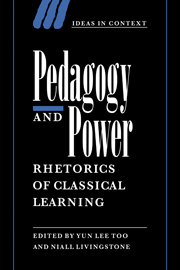Book contents
- Frontmatter
- Contents
- Notes on contributors
- Acknowledgements
- Introduction
- 1 Classics: from discipline in crisis to (multi-)cultural capital
- 2 Schoolboys and gentlemen: classical pedagogy and authority in the English public school
- 3 ‘Die Zung’ ist dieses Schwert': classical tongues and gendered curricula in German schooling to 1908
- 4 ‘What does that argue for us?’: the politics of teaching and political education in late eighteenth-century dialogues
- 5 Women and classical education in the early modern period
- 6 Pilgrimage to Parnassus: local intellectual traditions, humanist education and the cultural geography of sixteenth-century England
- 7 ‘Not so much praise as precept’: Erasmus, panegyric, and the Renaissance art of teaching princes
- 8 Teachers, pupils and imperial power in eleventh-century Byzantium
- 9 Reading power in Roman Greece: the paideia of Dio Chrysostom
- 10 Children, animals, slaves and grammar
- 11 A good man skilled in politics: Quintilian's political theory
- 12 The voice of Isocrates and the dissemination of cultural power
- 13 Xenophon's Cyropaedia: disfiguring the pedagogical state
- Select bibliography
- Index
- IDEAS IN CONTEXT
4 - ‘What does that argue for us?’: the politics of teaching and political education in late eighteenth-century dialogues
Published online by Cambridge University Press: 30 September 2009
- Frontmatter
- Contents
- Notes on contributors
- Acknowledgements
- Introduction
- 1 Classics: from discipline in crisis to (multi-)cultural capital
- 2 Schoolboys and gentlemen: classical pedagogy and authority in the English public school
- 3 ‘Die Zung’ ist dieses Schwert': classical tongues and gendered curricula in German schooling to 1908
- 4 ‘What does that argue for us?’: the politics of teaching and political education in late eighteenth-century dialogues
- 5 Women and classical education in the early modern period
- 6 Pilgrimage to Parnassus: local intellectual traditions, humanist education and the cultural geography of sixteenth-century England
- 7 ‘Not so much praise as precept’: Erasmus, panegyric, and the Renaissance art of teaching princes
- 8 Teachers, pupils and imperial power in eleventh-century Byzantium
- 9 Reading power in Roman Greece: the paideia of Dio Chrysostom
- 10 Children, animals, slaves and grammar
- 11 A good man skilled in politics: Quintilian's political theory
- 12 The voice of Isocrates and the dissemination of cultural power
- 13 Xenophon's Cyropaedia: disfiguring the pedagogical state
- Select bibliography
- Index
- IDEAS IN CONTEXT
Summary
In late eighteenth-century England, dialogues engaged with the literally revolutionary question of who should participate in civic debate. Writers used the idea of taking part in a conversation as a metaphor and a mise en scène for taking part in politics, and dialogues as both an implicit and explicit form of challenging old orders and questioning new regimes. Through choosing characters, and aiming at certain readerships, writers tried to control the terrain on which these questions were debated. The two-sided discourse of the simplest dialogues proved useful to writers on both radical and reactionary sides of that political conflict which grew from the 1760s discontent in Britain and acquired additional impetus from upheavals first in America in the 1770s, then in France in the 1780s and 1790s. The discussion which follows shows how, with reference to a selection of dialogues, and suggests how assumptions about classical antecedents could weight the dialogue ideologically.
Both progressive and conservative writers had to engage with the literary history of dialogues when choosing how to use it so as to represent their own times, and the transformative power of education therein. On the one hand, the dialogue's classical antecedents gave it the authority of the ancients, an immensely respectable literary history which seemed to predetermine it towards conservative uses. On the other hand, the assumed relations of this weighty authority were sufficiently stable to enable rewriting through parody and play. This made the dialogue simultaneously authoritative, and potentially subversive.
- Type
- Chapter
- Information
- Pedagogy and PowerRhetorics of Classical Learning, pp. 67 - 82Publisher: Cambridge University PressPrint publication year: 1998



